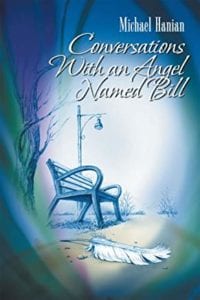
Shelf Unbound: The book begins with Max, an unremarkable guy out on an evening walk, suddenly being engaged in conversation by an angel named Bill. Where did the idea for this book come from?
Michael Hanian: Many years ago I used to live close to a park. I had a habit of staying up late and I would often go for a short walk well past midnight when the whole park was at my private disposal. On one such walk I started to have conversations with … well, a part of me probably, which I imagined to be an angel. These conversations lasted for several weeks and eventually I had a fairly good picture of my late night companion: no wings, no angelic posture, just a short and funny guy with a ponytail and a big rimmed hat.
Shelf Unbound: Bill gets Max to start thinking more deeply about his own life. Where does your interest in existential topics come from?
Hanian: One day I realized there is no death and writing one’s own obituary is my way of making this point. Death is just a transition from one state to another, a liberation of the soul from the bonds of the flesh. So why should we lament about it? This is how an angel named Bill wants Max to see death.
Shelf Unbound: Do you personally believe in angels?
Hanian: Of course I do! And most of all I believe in the variety without wings and feathers. We mistakenly call them humans, and they don’t object. It’s their actions that expose them as angels: they are tailored to help, to save, to empathize, and to love those who look like them, but who do very non-angelic things.
Shelf Unbound: In your book, Max finds out that women are a higher sex. Is there something in your experience that prompted this theme?
Hanian: Life is an experiential paradox. You grow up with certain assumptions like men are stronger, smarter and more advanced than women and then you meet someone who turns everything on its head. This happened to me when I met my future wife.
